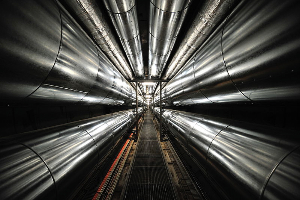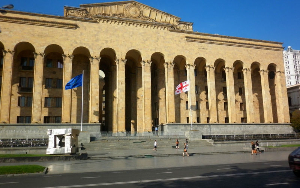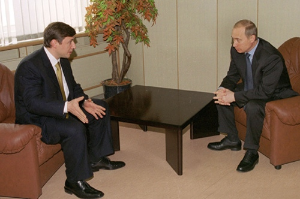Azerbaijan Struggles to Remain Unaligned in Wake of Ukraine Crisis
By Mina Muradova (07/02/2014 issue of the CACI Analyst)
The ongoing crisis in Ukraine has pushed several post-Soviet countries to decide whether they are primarily oriented toward the West or Russia. On June 27, Azerbaijan’s neighbor Georgia, along with Ukraine and Moldova, signed landmark partnership agreements with the European Union, which establish closer economic ties between these economically weak states and the EU. They obligate the countries to observe EU regulations governing customs, exports, and economic competition, and will allow them access to European markets.
At the same time, Azerbaijan’s other neighbor, Armenia, has committed to joining the Russia-dominated Eurasian Economic Union (EEU). Russia, Kazakhstan and Belarus signed an agreement on the establishment of the EEU in Astana on May 29. The summit was also attended by Armenian President Serzh Sargsyan, who nevertheless did not sign the agreement but asked for additional time.
Yet Baku has stuck to a pragmatic approach and has publicly rejected the Kremlin’s invitation to join the EEU, while being in no apparent hurry to enter any other agreement. Azerbaijan’s broader foreign policy of regional balance, favoring Euro-Atlantic integration while at the same time seeking to maintain good relations with Russia, allow Baku to reap benefits from all possible partnerships.
In June 2014, Russian ministers and high-level officials visited Azerbaijan to persuade Baku to enter closer cooperation with Moscow. Russia’s Economy Minister Alexei Ulyukayev visited Baku in early June to discuss economic cooperation and invite Azerbaijan to join the EEU. Russia’s Foreign Minister Sergei Lavrov then arrived on June 18-19 for a continuation of what he described as “a most active dialogue.” In addition, Azerbaijan hosted visits by Russia’s Deputy Prime Minister Dmitry Rogozin, Duma Speaker Sergei Naryshkin, and Development Minister Igor Slyunayev.
“Azerbaijan is our strategic partner … Our cooperation is being actively developed not only in a two-side format, but also in multi-side directions, including issues of stability and security in the Southern Caucasus and Caspian region,” Lavrov said at a news conference in Baku on June 18. The two sides discussed the situation in Ukraine, and Lavrov said that Azerbaijan has not been formally invited to join either the Customs Union or the EEU, but added that Moscow would welcome any partner interested in collaboration with those organizations.
Baku has indicated that it has no plans to join those blocs. “Azerbaijan yet has no intentions and doesn’t think about joining the Eurasian Union,” the Deputy Head (and Director of the Foreign Relations Department) of Azerbaijan’s Presidential Administration, Novruz Mammadov, told reporters on June 11.
According to Lavrov, the frozen conflict in Nagorno-Karabakh will not affect the Eurasian integration processes: “it is a subject of other international negotiations.” Kazakhstan’s President Nursultan Nazarbayev previously remarked that “the treaty with Yerevan must have a special provision about Armenia’s internationally recognized borders that do not encompass Nagorno-Karabakh.”
Commenting on Armenia’s accession to the Eurasian Union, Mammadov stressed that Azerbaijan has no reason to express any concern on this issue. Referring to an appeal from Baku to the presidents of Russia, Kazakhstan and Belorussia, that Armenia can join any organization under the same conditions as outlined in the treaty with the World Trade Organization, meaning within its internationally-recognized borders, Mammadov stressed that “this is our demand and it will be fulfilled.” Yet it is still unclear how this will be controlled.
Armenia’s ruling party insists that Karabakh will not join the EEU de jure, but Gagik Minasyan, the head of the committee on financial and budgetary affairs at the Armenian parliament, said that Armenia’s membership in the EEU will open new economic opportunities for Nagorno-Karabakh. Minasyan stressed that “Armenia and Nagorno-Karabakh are a single economic area and there can be no customs point between them.”
It appears that Azerbaijan’s refusal to join the EEU will not prevent continued arms sales from Russia. Dmitry Rogozin, who is overseeing the Russian defense industry and heading the Azerbaijan-Russia intergovernmental commission for cooperation also visited Baku in June.
According to the Atlas Analytical Research Centre, “The arms deals are beneficial for both Moscow and Baku. Moscow will get more money from arms sales and will keep Azerbaijan as a traditional market for Russian arms, while Baku will keep a strategic partnership on a high level and insure itself from serious problems with its Northern neighbor.” According to Atlas, Russian weapons sales makes up 80 percent of all Azerbaijan’s arms deals, which totaled about US$ 4 billion in the last four years and has included the transfer of many advanced systems to Azerbaijan.
In addition, Azerbaijan is willing to enhance its economic and humanitarian cooperation with Russia. Eleven commercial agreements were signed at a big Azerbaijan-Russia economic forum held in Gabala, with the participation of over 200 representatives from 25 regions of the Russian Federation. The sides discussed the expansion of transit traffic for all types of transport and agreed to ease border crossing procedures, particularly for automobile traffic.
Andrey Kazantsev, Director of the Analytical Center at the Moscow State Institute of International Relations, noted that the visits of Moscow’s emissaries to Baku constitute an attempt to maintain Russia’s sphere of influence in post-Soviet countries: “the competition for influence in post-Soviet countries has increased. While some of them have already determined who they are going to be with, there are still countries which continue to keep multi-direction policies and here either Russia or the West increases their efforts to attract them.”
According to Kazantsev, the U.S. is seeking to isolate Russia diplomatically due to its position on the Ukrainian crisis, and Russia is in turn trying to counteract these moves through the post-Soviet countries. Another key reason for Moscow’s activities is to brief Baku regarding Armenia’s accession to the EEU to avoid harming its strategic partnership with Azerbaijan, which is justified by arms sales and other economic agreements.
Dugin, Azerbaijan, and Russian Energy Strategy
By Dmitry Shlapentokh (06/18/2014 issue of the CACI Analyst)
Alexander Dugin, the well-known Russian conservative public intellectual and publicist, stated in April 2014 that if Baku would proceed with its anti-Russian policy, Moscow would not be able to guarantee the country’s territorial integrity. The implication is that Moscow would increase its support for Armenia and Azerbaijan would never be able to regain control over Nagorno–Karabakh, which remains Baku’s major foreign policy priority. While Dugin does not hold any official position, he has frequently functioned as an informal spokesman for some segments of the Russian elite and for this reason his views should be taken into account. They reflect Moscow’s displeasure with Baku due to Azerbaijan’s attempts to provide alternative gas routes to Europe.

Political Change in Abkhazia and South Ossetia Ahead of Georgia-EU Agreement
By Valeriy Dzutsev (06/18/2014 issue of the CACI Analyst)
Profound and simultaneous changes in Georgia’s breakaway regions of Abkhazia and South Ossetia signify Moscow’s increasing involvement in the affairs of its satellites. The changing political landscape in these territories appears to reflect Russia’s desire to establish greater control over them and make them more useful for its purposes. Russia’s control over Abkhazia and South Ossetia still fills the primary purpose of exerting pressure on Georgia. Georgia may again encounter hurdles in the run-up to signing its Association Agreement with the EU, although Russia too faces constraints as it is tied up in the battle for Ukraine.

SCO-CSTO Merger Raised at Dushanbe Conference
By Oleg Salimov (06/04/2014 issue of the CACI Analyst)
This year, Tajikistan presides over the Shanghai Cooperation Organization (SCO). The center of strategic research under the president of Tajikistan held a conference titled “SCO and the provision of regional security: problems and perspectives” in mid-May, 2014. The conference was devoted to expanding the SCO’s ability to provide regional security, and the merger of SCO and the Collective Security Treaty Organization (CSTO) was a primary topic of discussion.
Aside from issues pertaining to trade and infrastructure, the conference focused on new threats and challenges to regional security and the implications of the U.S./NATO withdrawal from Afghanistan. The SCO’s members presented a declaration containing provisions on increasing the organizations’ security potential, including integrated security measures for all states based on a common interpretation of current realities; a strategy for the SCO’s development and influence in the international arena; the development of regional infrastructure, industry, transportation, and trade; and the expansion of SCO; all aimed to increase the SCO’s political weight in the world.
The most notable statement at the conference was made by the host country’s representative, Khudoberdy Kholiknazarov, who called for a consolidation and merger of SCO and the CSTO, which he presented as being of key importance to regional security and stability.
The statement was a preceded by a meeting of the executive deputies of the Eurasian Economic Union (EAEU), the Commonwealth of Independent States (CIS), the CSTO, and the SCO on April 24, 2014 in the CSTO Moscow headquarter. For the most part, the four organizations unify former Soviet republics and are commonly seen as alternatives to Western international organizations. The attendees of this meeting discussed means for improving coordination and interaction in conditions of growing international confrontation, with reference to the current Ukrainian crisis and regional and global security threats. The CSTO’s Secretary General, Nikolai Borduzha, announced that the CSTO has halted its contacts with NATO as a result of NATO’s position on the crisis in Ukraine, and will instead search for partners in the Asia-Pacific region. In particular, the CSTO will seek closer ties with the SCO and its partners, particularly China and Iran. Hence, the recent SCO conference in Dushanbe became a platform for further probing into the possibility of merging the SCO and CSTO.
The calls for such a merger highlight the growing rift between the West and Russia. The members of these organizations have either expressed their support of Russia’s position on the crisis in Ukraine, like Kazakhstan and Armenia; made ambiguous statements, like China; or refrained from defining their position at all, like Tajikistan and Kyrgyzstan. Some long-term Central Asian leaders, who observed the toppling of Ukraine’s former President Viktor Yanukovych, will welcome the extra security measures that can be employed in case of democratic upheavals after the proposed SCO – CSTO merger. Although the CSTO’s main provision guarantees an embattled member military support from other members in case of external aggression, the 2010 additions to the agreement allow military assistance in cases of militant attacks, illegal armed forces, and other internal conflicts which can include democratic protests.
The expansion and improvement of transportation and communication infrastructure and logistic hubs discussed during the SCO conference are consistent with the needs of the CSTO, which focuses on creating effective military forces that can rapidly be deployed and moved around the region. One of the CSTO’s main declared tasks is the creation of an integrated military system in Central Asia, which will include air defense, intelligence information gathering, railroad protection and supply.
The merger discussions follows on the statement by NATO Deputy Secretary General Alexander Vershbow on May 1, 2014, that Russia is now considered less as a partner and more as an adversary, which in turn came after the CSTO decided to stop its contacts with NATO.
Russia holds leading positions in the SCO and CSTO and could extract substantial economic and political benefits from the merger. Russian influence would be multiplied by the inclusion of China, as a member of SCO, into the CSTO with the imposition of certain obligations which extend beyond political or diplomatic support and require direct military assistance. The widely discussed natural gas deal recently concluded between Russia and China bear the characteristics of leverage in Russia’s attempt to convince China on a SCO–CSTO merger. In part, it explains the rapid conclusion of a gas deal that took 10 years to negotiate.
Russian officials, particularly Gazprom’s CEO Alexei Miller, are unwilling to reveal the conditions or pricing policy of the 30-year gas deal. Even if the effect of the U.S. and EU economic sanctions urged Russia to conclude the agreement, the actual reasoning behind the move was to secure China’s support on the international arena. China has previously expressed support for Russia on Syria, and sought a middle ground between Russia and the West on Ukraine. An SCO-CSTO merger could form the next step in this relationship.
The obvious losers in this development are the people of the Central Asian SCO and CSTO members, whose interests will hardly be considered in the bargaining between Russia and China, and who will become even more dependent on their powerful neighbors. The exit of the U.S. from the regional political arena after the withdrawal from Afghanistan leaves Central Asian countries no other option than to conform to the powers filling up the political vacuum. The SCO conference in Dushanbe potentially marks the start of this process.
While an SCO–CSTO merger could potentially give rise to an extremely powerful international organization and an outright rival of NATO and the EU in the Eastern hemisphere, Russia and China still have a number of conflicting interests that they need to work through, including territorial disputes, rivaling claims to dominance in Central Asia, and Russia’s effort to balance between China and Japan. The intensified appeals for an organizational merger would also require Russia to increase its dependence on China in an attempt to exclude the U.S. and EU from its historical zone of influence. Hence, it remains to be seen whether the SCO–CSTO will move beyond political rhetoric.
Putin Appoints Russian Military General to Rule the North Caucasus
By Valeriy Dzutsev (05/21/2014 issue of the CACI Analyst)
Russia’s President Vladimir Putin is reshaping the administration of the North Caucasus and reshuffling his envoys to the region. The changes reflect Moscow’s frustration with the developments in this unstable territory, the declining financial resources of the central government, and a rebound of imperialist ideology in the Russian Federation. Previous attempts by the Russian government to use economic development as a policy tool to stop the violence and to assert greater control over the North Caucasus largely failed. Moscow’s fears of North Caucasian separatism still play a prominent role in the government’s policies in the region. Having crushed the large-scale insurgency, Russia still faces simmering conflict and has a profound lack of vision for the future of the region.









 Book S. Frederick Starr and Svante E. Cornell,
Book S. Frederick Starr and Svante E. Cornell,